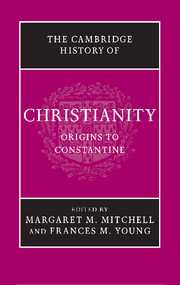Book contents
- Frontmatter
- Prelude: Jesus Christ, foundation of Christianity
- Part I The Political, Social and Religious Setting
- Part II The Jesus Movements
- Part III Community Traditions and Self-Definition
- 8 The emergence of the written record
- 9 Marcion and the ‘canon’
- 10 Self-definition vis-à-vis the Jewish matrix
- 11 Self-definition vis-à-vis the Graeco-Roman world
- 12 Self-differentiation among Christian groups: the Gnostics and their opponents
- 13 Truth and tradition: Irenaeus
- 14 The self-defining praxis of the developing ecclēsia
- Part IV Regional Varieties of Christianity in the First Three Centuries
- Part V The Shaping of Christian Theology
- Part VI ‘Aliens’ become Citizens: towards Imperial Patronage
- Conclusion: retrospect and prospect
- Bibliographies
- Index
- Map 1. The Roman Empire in the time of Marcus Aurelius
- References
11 - Self-definition vis-à-vis the Graeco-Roman world
from Part III - Community Traditions and Self-Definition
Published online by Cambridge University Press: 28 March 2008
- Frontmatter
- Prelude: Jesus Christ, foundation of Christianity
- Part I The Political, Social and Religious Setting
- Part II The Jesus Movements
- Part III Community Traditions and Self-Definition
- 8 The emergence of the written record
- 9 Marcion and the ‘canon’
- 10 Self-definition vis-à-vis the Jewish matrix
- 11 Self-definition vis-à-vis the Graeco-Roman world
- 12 Self-differentiation among Christian groups: the Gnostics and their opponents
- 13 Truth and tradition: Irenaeus
- 14 The self-defining praxis of the developing ecclēsia
- Part IV Regional Varieties of Christianity in the First Three Centuries
- Part V The Shaping of Christian Theology
- Part VI ‘Aliens’ become Citizens: towards Imperial Patronage
- Conclusion: retrospect and prospect
- Bibliographies
- Index
- Map 1. The Roman Empire in the time of Marcus Aurelius
- References
Summary
To engage the question of Christian self-definition is to become keenly aware that it is a process of differentiations and negotiations that is never final, and that the categories of description – ‘Christian’, ‘Jewish’, ‘Greek’, ‘Roman’ – are not to be taken for granted. The communities these categories are said to designate are neither stable nor essentially known entities, but social formations continuously engaged in self-recreation. With this in mind, I have endeavored to analyse a crucial moment in the second century of the formation of a ‘Christian’ discourse and, indeed, of the construction of ‘Christianity’ itself. Justin Martyr was not the first to take up the question of self-definition vis-à-vis the Graeco-Roman world, and he would certainly not be the last, but he was surely one of the most influential to do so. It was Justin more than anyone else who would set the terms in which Christianity would be represented to the wider world of antiquity, and a whole host of Christian writers would follow in his path, elaborating and expanding upon his project of self-definition. What is more, a least one ‘Graeco-Roman’ author of the second century appears to have taken notice of Justin’s works and felt compelled to issue a response: the Alēthēs logos of the otherwise unknown Platonist, Celsus, represents the first systematic attack on Christianity. Taken together, Justin and Celsus signal a turning-point in the construction and contestation of Christian discourse in the second century.
Keywords
- Type
- Chapter
- Information
- The Cambridge History of Christianity , pp. 230 - 244Publisher: Cambridge University PressPrint publication year: 2006
References
- 3
- Cited by

